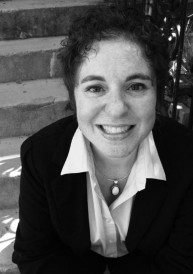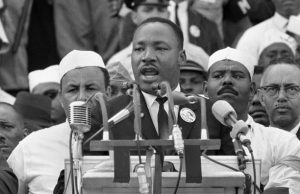Building a Racial Justice Praxis
By Lisa Weiner-Mahfuz
Have you ever had moments in your life that you know have changed you forever? Moments that shifted your consciousness, changed how you organize or opened up a whole new world of relationships and authentic expressions of solidarity you never knew were possible?
As organizers we don’t often have the space and time to talk about the moments that shape us. Nor do we often have time to reflect on what we are learning, what inspires us and what our next learning edge may be. What I know for sure is that there are movement and personal moments that have forever changed my consciousness as a feminist and racial justice organizer. With each pivotal experience, I have been able to dig deeper into my own complex relationship to race and feminism as a light-skinned/Arab-Jew/queer/disabled/cis-gendered woman.
Recently, a friend of mine asked me to review an advanced copy of his book on racial justice and movement building. In the forward to the book he shares that he has always found racial justice/anti-racist/feminist biographical stories important to his understanding of how activists come to radical consciousness. This got me thinking about some of the seminal experiences that have shaped my understanding of three core principles that guide my own racial justice work: Maintaining a rigorous racial justice praxis that is based on learning, self-reflection, action and more self-reflection; valuing the necessity of discomfort when the struggle is honest and accountable; understanding that political alignment is almost never based on identity but rather on shared values and a commitment to collective liberation.
One of my early discoveries was the importance of developing a practice of study and reflection. I began to understand early on that I was on a life-long learning journey. I not only needed to reflect on my own complex identities but, also, I could not expect any other community of color to teach me about the specificity of their oppressions. I had to take ownership of a learning process that was daunting as someone with dyslexia who finds reading very difficult. Yet, I had this pivotal moment in the early 90s that expanded my mind and challenged my own understanding of racial justice when I read Sister Outsider by Audre Lorde.
The book was an assignment in my Women’s Studies class and it was the only book on the syllabus written by a woman of color. My mind exploded and I could feel my insides burning as I read the book. I finally had the words to describe my experiences of privilege and oppression as a light skinned Arab/Jew. I began exploring the role of Zionism, Anti-Semitism, race, culture, faith, gender and sexuality in my own life history. I began scouring the college library for all of the radical writings I could get my hands on from Gloria Anzaldúa and Angela Davis to Nikki Giovanni and Joanna Kadi. My appetite for exploring the intersection between feminism and racial justice was insatiable and it remains so to this day. This experience challenged me to develop a life-long practice of learning, reflection and doing my own work around intersectionality and privilege.
In 1993 I was a Junior at Wheaton College in Norton Massachusetts. Just a few years prior, the trustees decided that Wheaton would transition to a co-educational institution. Yet, unlike many other women’s colleges that have made this transition, Wheaton decided that it would institute a gender-balanced and feminist curriculum campus wide. The goal of which was to ensure that the voices and perspectives of women remained central to campus life and learning with a particular focus on how power dynamics change when men and women share a classroom.
The early years of this transition were not easy for Wheaton. There was both consternation and creativity throughout campus as the first co-educational classes began their four year journey. It was within this context, that I co-organized a project entitled the House for Feminist Perspectives. The house was a living and learning community of women committed to exploring the interconnectedness of race, class, gender, sexual orientation and disability. A diverse core group of women got together and petitioned the college for a dormitory so that 28 of us could live and learn together to explore feminism from an intersectional perspective. Our intention was to explore a range of community wide issues including race and class on our predominantly white and upper-middle class campus, the invisibility of students and faculty of color, the white-washing of Women’s Studies and feminism, and the implementing of the new gender balanced/feminist curriculum in ways that centered racial justice and intersectionality.
In the Fall of 1993, the House for Feminist Perspectives opened its doors. At the time, this space was the most intentionally intersectional space on campus as women of color/queer/working class/cultural workers/women with disabilities/artists filled its hallways. Two things began to happen soon after we settled into our feminist living and learning space. First, collective struggle around the very same issues that brought us together began to both erode and strengthen relationships. As the mirror turned inward around our own issues of privilege and oppression, we grappled collectively with our understandings and experiences of feminism. Secondly, as we collectively struggled, we encountered a campus that was largely unprepared to support and engage in a meaningful dialogue around racial, economic, queer and gender justice along-side of us. Taken together, these tensions inside the house and throughout campus led to hard, honest and transformative struggles.
Twenty years later, I am still deeply impacted by this time in my life and the relationships that evolved from it. Why? Because at an early point in my life this moment gave me the opportunity engage honestly and fiercely around racial justice in a way that have stayed with me for twenty years. Through this experience I know what righteous struggle looks like. The kind of righteous struggle that doesn’t stop or start but transforms you over a lifetime. I also know that building trust and beloved community based on an uncompromising commitment to challenging power and privilege are some of the most important building blocks to authentic multi-racial alliances and friendships. Of course there is no perfect path to solidarity. Yet, what these friendships have taught me is how to stay on the path even when the dialogue and internal work gets really fucking hard.
Thirteen years later I had another seminal moment. This one showed me the importance of building beloved community based on shared values and accountability rather than just on identity politics. This experience also revealed that some of the most important intersectional work we can do is to search deeply for interdependence and solidarity in places where we never thought possible.
I was at a convening in New York in 2007 that brought together queer racial justice, disability justice and Two Spirit organizers from the Audre Lorde Project, Southerners on New Ground, Queers for Economic Justice, The Two Spirit/First Nations Collective and the Disability Justice Collective. The focus of our convening was to grapple with how to develop organizing strategies and training curriculum that deepened multi-issue organizing in the LGBT movement from the perspective of queer people of color.
I remember a dozen of us sitting around a table trying to articulate how disability justice and sovereignty intersected with queerness, race and class. Even though we knew that all forms of oppression intersect, most of us had not had the experience of intentionally centering sovereignty and disability in our work to build a queer liberation movement. From the beginning of our work, we had some BIG questions we didn’t know how to answer. Yet, we were committed to meeting the challenge of bringing to the center of our racial and economic justice work issues of disability and sovereignty precisely because they were issues the queer movement ignored.
At one point in the convening we had this break through moment. Members of the First Nations Collective shared why self determination over land, body, resources, family and community was a core front of struggle for First Nations communities as a direct result of 500 years of genocide and colonization. In turn, members of the Disability Justice Collective shared why people with disabilities have been systematically denied access to community spaces, familial spaces and decision making around our bodily autonomy.
It became clear that what connected all of us across all lines of difference was that we came from communities on the margins where access to and self determination over our own land, resources, sexuality, desire, bodies, communities and families have been denied. We also recognized that society’s strategy for denying both of these things was to pathologize, medicalize, institutionalize, police, target, imprison, deny us a living wage and sexualize and/or sterilize our bodies. We came to a collective understanding that the relationship between access and sovereignty was quintessentially queer. Any time an organizing strategy starts with how to collectively liberate our bodies from society’s need to control them and deem them dirty and dispensable it is a feminist/womanist/queer strategy.
Since 2007, we have gone on to work together to build a body of training and organizing work that connects all of these issues and centers sovereignty and access in our work. Together we have literally trained hundreds of queer organizers across the country using our “Access, Sovereignty and Liberation” curriculum. What has made this journey so pivotal is that it gave me the opportunity to work in a coalition of people committed to doing the hard work of bringing issues relegated to the margins of our movement to its center. In an LGBT movement that consistently narrows its political agenda in order to win rights for some of us rather than justice for all of us, this experience has taught me how critical it is to stay rooted in the complexities of our lives and experiences. I have come to understand that the biggest insights into how to organize for our mutual liberation often come from those places where relationships and ideological connections have yet to be forged. This is what it means to build a movement that fully represents the full breadth and depth of communities.
Throughout the past twenty years I have been blessed by experiences and relationships that have challenged me and deepened my racial justice consciousness. I wrote this piece because I hope that it inspires more of us to share the stories that have opened up our minds and hearts on the path to justice and collective liberation, even when they reveal our deepest questions and struggles. Isn’t that what working for liberation is all about?
________________________________________
 Lisa Weiner-Mahfuz is the founder of intersections/intersecciones consulting. Weiner-Mahfuz has worked in several movements for social justice with a particular emphasis on building grassroots political power across movements, issues, identities and communities. As a capacity builder, movement builder, cultural worker and writer she has dedicated much of her organizing life to challenging oppression at the intersections of race, class, gender, sexual orientation, gender identity and disability.
Lisa Weiner-Mahfuz is the founder of intersections/intersecciones consulting. Weiner-Mahfuz has worked in several movements for social justice with a particular emphasis on building grassroots political power across movements, issues, identities and communities. As a capacity builder, movement builder, cultural worker and writer she has dedicated much of her organizing life to challenging oppression at the intersections of race, class, gender, sexual orientation, gender identity and disability.
Her writings can be found in Colonize This! Young Women of Color and Feminism (Seal Press, 2002), Fireweed Magazine’s “Mixed Race Issue” (Issue 75), through the Bilerico Project Blog, and a web-based project entitled BustingBinaries, which she co-authors with Ana Maurine Lara. You can also frequently catch her tweeting about a wide range of justice issues at @MovetheMovement!




0 comments